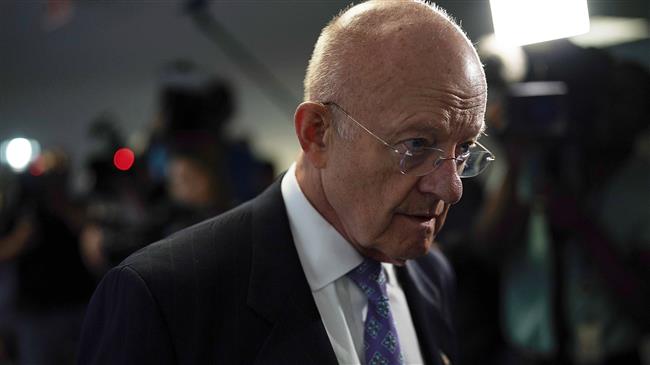Trump’s Iran policy of regime change ‘wishful thinking’: US national security leaders
More than 50 prominent US foreign policy, intelligence and national security figures have urged the administration of President Donald Trump to change its strategy toward Iran, saying any desire for “regime change” in the country is “wishful thinking.”
In a statement released on Sunday, the national security leaders said that the current administration’s strategy of pressure campaign against the Islamic Republic could lead to military conflict.
“The Trump Administration’s Iran strategy is to assert maximum economic, political and military pressure to change Iran’s behavior and threaten, if not cause, collapse of the regime. But since it has not undertaken diplomatic engagement on any of its twelve demands on Iran, the Administration has left Iran the option of either capitulation or war,” the authors wrote.
The signatories of the letter, which include former Secretary of State Madeleine Albright, former Director of National Intelligence James Clapper and former Senators Richard Lugar and Carl Levin, asserted that President Trump’s decision in May to withdraw the US from the 2015 Iran nuclear deal “does not advance the achievement of any of the U.S.’s objectives.”
They further argued that the “suggested policy of regime change reflects wishful thinking and a flawed interpretation of intelligence about Iran’s vulnerability."
Since Trump tweeted that the UN Security Council meeting he'll chair will be on Iran, here's a reminder that nearly every step he's taken — including cynically floating talks toward a broader deal — is right out of John Bolton's playbook for regime change https://t.co/zSeUxE3cUU
— Dylan Williams (@dylanotes) September 21, 2018
While Iran’s economy is under pressure and there are some signs of discontent among its population, the country “remains strong, well-armed and united against outside threat,” the security experts noted.
They cautioned the White House that the 2003 US invasion of Iraq served as “a striking reminder of our inability to estimate accurately the long-term impact of U.S. actions."
The letter, however, is not entirely critical of the Trump administration's approach and the signatories offer support for some of the administration’s objectives.
The message comes ahead of President Trump’s appearance at the United Nations General Assembly on Tuesday, where he is set to deliver a speech dominated by Iran and North Korea.
The US president will also chair a Security Council meeting on the nonproliferation of weapons of mass destruction on Wednesday. Observers expect him to use the opportunity to again attack Iran.
Secretary of State Mike Pompeo said that Trump was open to holding talks with Iranian President Hassan Rouhani during this week's General Assembly gathering.
"I think the president's been pretty clear about that. He's happy to talk with folks at any time," Pompeo said on NBC on Sunday. "If there's a constructive dialogue to be had, let's get after it."
Trump entered the White House promising to take a more aggressive approach to Iran than his predecessor, Barack Obama, whose administration negotiated the landmark nuclear deal with Tehran along with Britain, France, Russia, China and Germany.
Since then, he has surrounded himself with known Iran hawks like John Bolton, and reimposed many of the sanctions that were lifted as part of the 2015 deal.
On Saturday, Trump’s attorney, Rudolph Giuliani, told members of an exiled anti-Iran group that the administration sympathized with their efforts to overthrow the government in Tehran.

“So I say to the Iranian government, you must truly be afraid of being overthrown,” Giuliani told members and supporters of the National Council of Resistance of Iran (NCRI).
The NCRI comes to New York annually during the gathering of world leaders at the UN General Assembly, staging protests outside the world body against Iran’s leaders.
The terrorist Mujahedin-e Khalq Organization (MKO) is politically linked to the NCRI. The US government considered the MKO a terrorist group until 2012, when the State Department removed it from its list of such organizations.
Tel Aviv tells Damascus Israeli forces will remain in occupied territory: Report
Dec. 22: ‘Axis of Resistance’ operations against Israeli occupation
‘Abhorrent’: Oxfam says only 12 trucks delivered aid in North Gaza since Oct.
VIDEO | Leader receives religious eulogists on Hazrat Fatima birth anniv.
Pope Francis slams Israel’s ‘machine-gunning’ of Gaza children
US hostage-taking of Iranian nationals violation of intl. law: Deputy FM
VIDEO | Carol Singers for Palestine on London’s Parliament Square
Ansarullah says ‘Israeli terrorists’ incapable of confronting Yemen, warns of secret weapons











 This makes it easy to access the Press TV website
This makes it easy to access the Press TV website